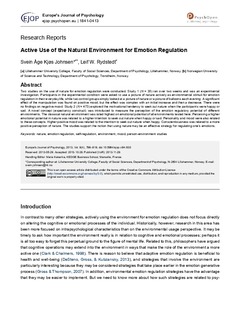Active Use of the Natural Environment for Emotion Regulation
Journal article, Peer reviewed
Published version
Permanent lenke
http://hdl.handle.net/11250/2628055Utgivelsesdato
2013Metadata
Vis full innførselSamlinger
Sammendrag
Two studies on the use of nature for emotion regulation were conducted. Study 1 (N = 35) ran over two weeks and was an experimental
investigation. Participants in the experimental condition were asked to use a picture of nature actively as environmental stimuli for emotion
regulation in their everyday life, while two control groups simply looked at a picture of nature or a picture of balloons each evening. A significant
effect of the manipulation was found on positive mood, but the effect was complex with an initial increase and then a decrease. There were
no findings on negative mood. Study 2 (N = 473) explored the motivational tendency to seek out nature when the participants were happy or
sad. A novel concept (expectancy construct) was introduced to measure the perception of the emotion regulatory potential of different
environments. The classical natural environment was rated highest on emotional potential of all environments tested here. Perceiving a higher
emotional potential in nature was related to a higher intention to seek out nature when happy or sad. Personality and mood were also related
to these concepts. Higher positive mood was related to the intention to seek out nature when happy. Conscientiousness was related to a more
positive perception of nature. The studies support the notion that using nature may be an effective strategy for regulating one’s emotions.
